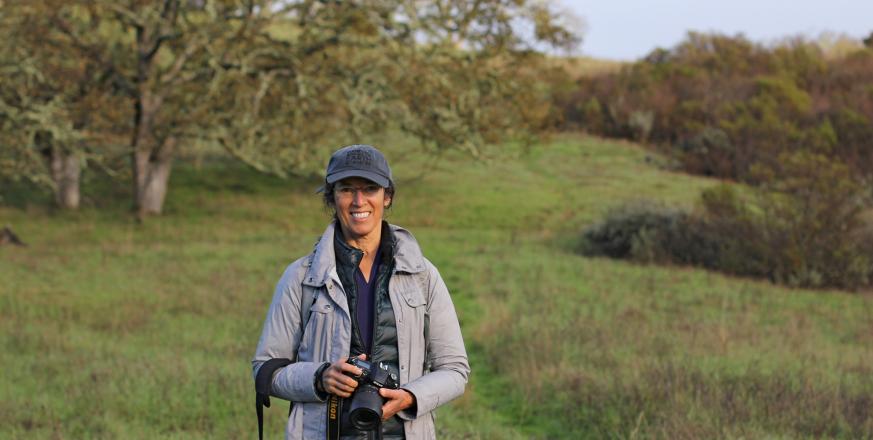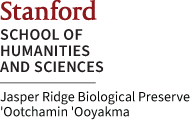Nona Chiariello, Staff Scientist at Jasper Ridge Biological Preserve, will retire from Stanford University

Nona Chiariello, Staff Scientist at Jasper Ridge Biological Preserve, will retire from Stanford University in January 2024 after serving in this role for more than 35 years.
Over the past 50 years of Jasper Ridge Biological Preserve, the preserve has been blessed with a constant flow of dedicated people involved in accomplishing research, education, and conservation goals. However, Nona is among those who have contributed the longest to the success of Jasper Ridge. Literally, hundreds, if not thousands, of faculty and students have benefitted from Nona’s generosity and intellectual contribution.
Anyone who has proposed and carried out a project at Jasper Ridge knows that Nona is such an indispensable person to consult with, always full of helpful information, advice, encouragement, inspiration, and many ideas. Whenever we have an idea about a new project we would like to start at Jasper Ridge, we consult Nona and seek her advice, and she always has useful and interesting ideas and specific logistical advice to provide.Nona would walk with the investigator to the site of the proposed project - these were the moments where one would experience the deep and personal knowledge Nona has with the preserve.
Nona’s knowledge of past and ongoing projects at Jasper Ridge is comprehensive despite the very broad range of projects that are happening at Jasper Ridge all the time and their sheer number. With this knowledge, combined with her deep understanding of the natural history of Jasper Ridge and her interest and ability to keep up with new research techniques that can be applied at Jasper Ridge, Nona has greatly facilitated and enhanced many research, education, and conservation efforts at Jasper Ridge over the years.
To get a glimpse of Nona’s approach to Jasper Ridge, one can watch the video made by the university back in 1998 to describe Jasper Ridge’s history and some of the projects ongoing at that time. In this video, Nona places the diverse range of projects in the context of Jasper Ridge’s overall mission and its future. The way she articulates the significance of the preserve and the value of each of the projects ongoing at Jasper Ridge characterizes Nona’s dedication and talent that have persisted throughout her long career as staff scientist.
The projects benefited from Nona’s guidance and involvement are many, but one of her most significant contributions is the Jasper Ridge Global Change Experiment. Led by Chris Field and involving other Stanford faculty members for 21 years from 1998 to 2019, this ambitious long-term experiment involved many students, faculty, and docents. Nona was not only one of the core researchers who contributed to important discoveries from the experiment, but she also coordinated and managed this effort throughout the duration of the experiment.
Another example is her contribution to the design and implementation of Biology 47 (formerly Biology 44Y): Introduction to Research in Ecology and Evolutionary Biology, an undergraduate class taken each year by about 100 students majoring in Biology, Human Biology, Earth Systems, etc. This class is taught with Jasper Ridge as its main field site for inquiry-based learning, using the sticky monkeyflower and their pollinators and associated microbial communities as a focal subject for this course. Nona was the one who suggested these organisms as a focus, which became successful, as recognized by the Science prize for inquiry-based instruction, a recognition given by the American Association for the Advancement of Science. Nona supported the Biology 47 instructor team over the past 15 years by giving them numerous ideas for the field research that the students could work on and taking various measurements that the students have used in combination with the field data that they collected themselves. In 2020, during the COVID-19 pandemic, Nona made an introductory video for the students who needed to take the Biology 47 class virtually.
Nona’s work has been recognized widely by the Stanford community. In 2019, she received the Marsh O’Neill Award for Exceptional and Enduring Support of Stanford University’s Research Enterprise. The awardees of this award, one of the university’s highest honors, are nominated by faculty in recognition of demonstrable impact in supporting the research of many different investigators. Earlier Nona received the Kenneth M. Cuthbertson Award (2006-07) for exceptional contributions to Stanford.
Nona’s work has also been recognized more broadly beyond Stanford. In 2017, Nona was elected as a Fellow of the California Academy of Sciences, in recognition of her ground-breaking work in grassland ecology, plant ecophysiology, and global change biology, much of it in connection with the Jasper Ridge Global Change Experiment, as well as her long-term commitment to facilitating the research of and mentoring many scientists and students at Jasper Ridge.



